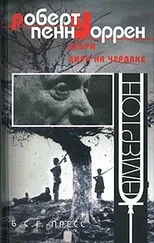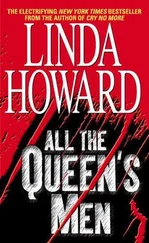And went out.
But she stood with her hand on the doorjamb. "One thing," she said.
"What?" I asked.
"A favor," she said, "to me. Before you ever use those things, those papers, show them to Judge Irwin. Give him a chance. At least, a chance."
I agreed to that.
The big black Cadillac, the hood glistening dully under the street lamps–as I could see even from the back seat–eased down the street, making its expensive whisper under the boughs which had new leaves on them, for it was early April now. Then we got to a street where there were not any nice trees arching over.
"Here," I said, "that place on the right, just beyond that grocery."
Sugar-Boy put the Cadillac up to the curb, like a mother laying Little Precious down with a last kiss. The he ran around to open the door for the Boss, but he boss already on the curb. I uncoiled myself and stood beside him. "This is the joint," I remarked, and started in.
For we were going to see Adam Stanton.
When I told the Boss that Adam Stanton would take the job and that he had sent me a message to arrange things, the Boss had said, "Well." Then he had looked at me from toe to crown, and said, "You must be Svengali."
"Yeah," I had said, "I am Svengali."
"I want to see him," the Boss had said.
"I'll try to get him up here."
"Get him up here?" the Boss had said. "I'll go there. Hell, he's doing me a favor."
"Well, you're the Governor, aren't you?"
"You're damned right I am," the Boss had said, "but he is Doc Stanton. When do we go?"
I had told him it would have to be at night, that you never could catch him except at night.
So here we were, at night, entering the door of the crummy apartment house, climbing the dark stairs, stumbling over the kiddie car, inhaling the odor of cabbage and diapers. "He sure picked himself a place to live," the Boss said.
"Yeah," I agreed, "and lots of folks can't figure out why."
"I reckon I can," the Boss said.
And as I wondered whether he could or not, we reached the door, and I knocked, entered, and confronted the level eyes of Adam Stanton.
For a half moment, while Sugar-Boy was easing in, and I was shutting the door, Adam and the Boss simply took each other in, without a word. Then I turned and said, "Governor Stark, this is Dr. Stanton."
The Boss took a step forward and put out his right hand. Perhaps I imagined it, but I thought I noticed a shade of hesitation before Adam took it. And the Boss must have noticed it, too, for when Adam did put out his hand, the Boss, in the middle of the shake, before any other word had been spoken, grinned suddenly, and said, "See, boy, it's not as bad as you thought, it won't kill you."
Then, by God, Adam grinned, too.
Then I said, "And this is Mr. O'Shean," and Sugar-Boy lurched forward and put out one of his stubby arms with a hand hanging on the end of it like a stuffed glove, and twisted his face and began, "I'm pl-pl-pl-pl–"
"I'm glad to know you," Adam said. Then I saw his glance pick up the bulge under Sugar-Boy's left armpit. He turned to the Boss. "So this is one of your gunmen I've heard about?" he said, definitely not grinning now.
"Hell," the Boss said, "Sugar-Boy just carries that for fun. Sugar-Boy is just a pal. Ain't anybody can drive a car like Sugar-Boy."
Sugar-Boy was looking at him like a dog you've just scratched on the head.
Adam stood there, and didn't reply. For a second I thought the deal was about to blow up. The Adam said, very formally, "Won't you gentlemen have seats?"
We did.
Sugar-Boy sneaked one of his lumps of sugar out of the side pocket of his coat, put it into his mouth, and began to suck it, with his fey Irish cheeks drawn in and his eyes blurred with bliss.
Adam waited, sitting straight up in his chair.
The Boss, leaning back in one of the overstuffed wrecks, didn't seem to be in ant hurry. But he finally said, "Well, Doc, what do you think of it?"
"Of what?" Adam demanded.
"Of my hospital?"
"I think it will do the people of the state some good," he said. Then added, "And get you some votes."
"You can forget about the vote side of it," the Boss said. "There are lots of ways to get votes, son."
"So I understand," Adam said. Then he handed the Boss another big chunk of silence to admire.
The Boss admired it awhile, then said, "Yeah, it'll do some good. But not too much unless you take over."
"I won't stand any interference," Adam said, and bit the sentence off.
"Don't worry," the Boss laughed. "I might fire you, boy, but I wouldn't interfere."
"If that is a threat," Adam said, and the pale-blue blaze flickered up in his eyes, "you have wasted your time by coming here. You know my opinions of this administration. They have been no secret. And they will be no secret in the future. You understand that?"
"Doc," the Boss said, "Doc, you just don't understand politics. I'll be frank with you. I could run this state and ten more like it with you howling on every street corner like a hound with a sore tail. No offense. But you just don't understand."
"I understand some things," Adam said grimly, and the jaw set.
"And some you don't, just like I don't, but one thing I understand and you don't is what makes the mare go. I can make the mare go. And one more thing, now we are taking down our hair–" The Boss suddenly stopped, cocked his head, leered at Adam, then demanded, "Or are we?"
"You said there was one more thing," Adam replied, ignoring the question, sitting straight in his chair.
"Yeah, one more thing. But look here, Doc–you know Hugh Miller?"
"Yes," Adam said, "yes, I know him."
"Well, he was in with me–yeah, Attorney General–and he resigned. And you know why?" But he went on without waiting for the answer. "He resigned because he wanted to keep his little hands clean. He wanted the bricks but he just didn't know somebody has to paddle in the mud to make 'em. He was like somebody that just loves beefsteak but just can't bear to go to a slaughter pen because there are some bad, rough men down there who aren't animal lovers and who ought to be reported to the S. P. C. A. Well, he resigned."
I watched Adam's face. It was white and stony, as though carved out of some slick stone. He was like a man braced to hear what the jury foreman was going to say. Or what the doctor was going to say. Adam must have seen a lot of faces like that in his time. He must have had to look into them and tell them what he had to tell.
"Yeah," the Boss said, "he resigned. He was one of those guys wants everything and wants everything two ways at once. You know the kind, Doc?"
He flicked a look over at Adam, like a man flicking a fly over by the willows in the trout stream. But there wasn't any strike.
"Yeah, old Hugh–he never learned that you can't have everything. That you can have mighty little. And you never have anything you don't make. Just because he inherited a little money and the name Miller he thought you could have everything. Yeah, and he wanted the one last damned thing you can't inherit. And you know what it is?" He stared at Adam's face.
"What?" Adam said, after a long pause.
"Goodness. Yeah, just plain, simple goodness. Well you can't inherit that from anybody. You got to make it, Doc. If you want it. And you got to make it out of badness. Badness. And you know why, Doc?" He raised his bulk up in the broken-down wreck of an overstuffed chair he was in, and leaned forward, his hands on his knees, his elbows cocked out, his head outthrust and the hair coming down to his eyes, and stared into Adam's face. "Out of badness," he repeated. "And you know why? Because there isn't anything else to make it out of." Then, sinking back into the wreck, he asked, softly, "Did you know that, Doc?"
Adam didn't say a word.
Читать дальше





![Роберт Уоррен - Рассказы [Компиляция]](/books/419993/robert-uorren-rasskazy-kompilyaciya-thumb.webp)


